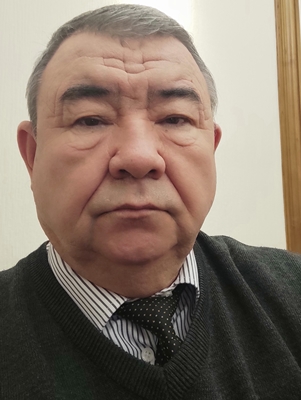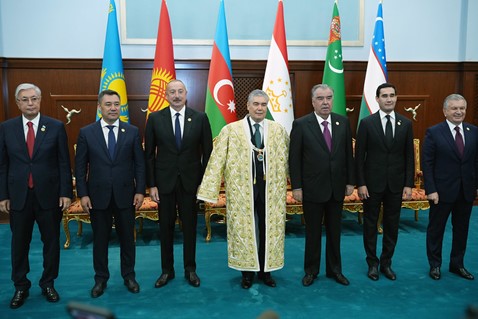Dr. Begench Karaev
The Caliph asked: “So you are Layla, that drove the poor man Kais crazy?
But I don’t find beauty in you, no matter how I look, I’m not going crazy!”
And the lips of the young maiden whispered: “To see beauty, you must be
Majnun,
And carry its light in your eyes, and be faithful to me in both worlds…
…And yet the Truth knocks on those who believe, like a traveler on a locked
doors.
And if in your soul you only harbor thoughts about where the loss is, where the gain is,
… There, everyone invariably loses who is connected with what is illusory
and perishable.
Abdurrahman ibn Khaldun
* * *
Part 2. Truth in dialogue
The past year 2023, declared by the UN as the “International Year of Dialogue as a Guarantee of Peace,” once again demonstrated in practice the need to urgently gather at the negotiating table of the leaders of world powers to take effective measures to stop the escalation of confrontation at the global level.
As you know, the motto of the year was determined in accordance with the UN General Assembly resolution of December 6, 2022, adopted as a result of unanimous support for the initiative of Turkmenistan called “Dialogue – a guarantee of peace.” The political and philosophical essence of such a Dialogue was formed by the National Leader of the Turkmen People Gurbanguly Berdimuhamedov during his speech from the rostrum of the International Forum of Peace and Trust in December 2021 in Ashgabat.
During the year, events took place around the world, with the adoption of relevant documents, in support of political and diplomatic dialogue. The “Dialogue is a Guarantee of Peace” conference, held on December 11, 2023 in Ashgabat, can be described as one of the final forums. The press release of the international forum stated the successes achieved in implementing Turkmenistan’s initiative at various international platforms, and primarily at the UN. As it was emphasized in this document: “the initiative was the result of a thorough and objective analysis of the current international situation, the nature and trend in interstate relations. At the same time, it acts as a call to all states to realize their responsibility for the fate of the world, stop the growing escalation and intolerance, soberly analyze the current situation in the world, and rethink it from a historical and perspective point of view.”
It was also noted that “dialogue, which acts as a guarantee of peace on the planet, is a living, creative process that is designed to cover a significant range of activities. In this context, it is indicated that it is advisable to expand the projection of this formula to solve universal problems in such areas as environmental change, refugee problems, ensuring food security, and a number of other important humanitarian topics. At the same time, it was proposed, together with partners from interested states and international specialized organizations, to think about the formation of program actions in these areas for the medium term.”
This thesis once again emphasizes the need to approach the problems of international dialogue taking into account the global interconnectedness of humanity, the indivisibility and integrity of security.
Considering the seriousness of the current situation in the entire system of modern international relations, Turkmenistan proposed to begin developing a Global Security Strategy, as one of the fundamental documents of the UN. The political and diplomatic basis of this Strategy is strengthening mutual understanding and cooperation of the parties, developing constructive solutions through dialogue, while maintaining an atmosphere of mutual respect and trust.
President of Turkmenistan Serdar Berdimuhamedov, in his speech at the V Consultative Meeting of the Heads of State of Central Asia on September 16, 2023 in Dushanbe, stated that: “Of course, when setting specific goals for ourselves, we proceed from the fact that the key condition for achieving them is strong and long-term peace and security and stability in our region, based on mutual respect, consideration of interests, adherence to recognized norms of international law and the Charter of the United Nations .” In this context, attention was drawn to the special significance of the UN General Assembly Resolution of July 28, 2022, declaring Central Asia a Zone of Peace, Trust and Cooperation. As the President of Turkmenistan emphasized: “We consider the adoption of this document as an important step towards strengthening the atmosphere of mutual understanding and cooperation in our region, transforming Central Asia into an area of lasting peace and security for solving economic, environmental, humanitarian problems and achieving the Sustainable Development Goals.”
In development of the implementation of the above-mentioned document of the UN General Assembly, the head of Turkmenistan proposed the creation of a Dialogue on Security and Cooperation in Central Asia under the auspices of the UN. Its goal is to develop approaches and solutions aimed at bringing together and synchronizing the efforts of the Central Asian countries in ensuring sustainable, conflict-free development of our region.
The National Leader of the Turkmen people, Chairman of the Halk Maslakhaty of Turkmenistan Gurbanguly Berdimuhamedov, in his speech at the ceremony of awarding him the Badge of Honor of the Heads of State of Central Asia, especially emphasized: “Our countries have extensive natural resources, strong industrial and technological potential, which implies the development and strengthening of cooperation. Their unification, the creation of cost-effective partnership production lines, integration and cooperation corridors are a pressing topic, because Central Asia is one of the cradles of world civilization, located at the crossroads of the Great Silk Road. We pursue an “open door” policy based on the principles of peace, good neighborliness and fruitful cooperation in the regional and global dimensions.”
President of Kazakhstan Kassym-Jomart Tokayev, in his speech at the Dushanbe summit, called on the meeting participants to speak from common or maximally similar positions in order to show solidarity and unity to the world community. “In the context of a rapidly changing world order, improving the existing mechanisms of interaction between our countries in the field of security is becoming important,” said the head of Kazakhstan. To develop specific preventive measures, the President of Kazakhstan also proposed holding a Dialogue on Security and Cooperation in Central Asia in Kazakhstan in 2024 at the level of secretaries of security councils.
The heads of state of Central Asia emphasize the growing pace of consolidation of joint efforts in all aspects of regional relations. In particular, President of Uzbekistan Shavkat Mirziyoyev noted that the holding of the fifth Consultative Meeting and the initiatives put forward “demonstrate our desire to strengthen relations of trust, good neighborliness and partnership, and increase practical interaction.” As the head of Uzbekistan emphasized: “The most important thing is that stability and unity are strengthening in Central Asia.”
To more fully understand the essence of the initiative of the Turkmen state to develop a Global Security Strategy, it is necessary to analyze the potential and prospects for its implementation, taking into account the entire spectrum of confrontation between the great powers – permanent members of the UN Security Council.
The paradox of the current situation is that the emerging picture of communication at the level of the UN Security Council, to put it mildly, is somewhat different from what is called “constructive dialogue.” The fact is that while the Central Asian states are relatively young, but jointly seeking solutions to the pressing problems of our time, offering a fundamental conversation about peace and security, the contradictions between some of the great powers, the founders of the UN, are approaching a peak state. It would seem that they, first and foremost, should take all necessary measures, including those of a preventive nature, in order to prevent tension from escalating in the system of international relations.
It is necessary to pay attention to the fact that as the situation in the international arena becomes more complex, the countries of Central Asia are showing the potential for purposeful dialogue, which forms a consolidated basis for joint actions. The growing importance of Central Asia is evidenced by the establishment of about one and a half dozen cooperation formats under the “CA5+” formula. Over the past few years, the states of the region have initiated the adoption of more than a dozen United Nations resolutions on important aspects of regional and broader international development.
In addition, the energetic “five” speak coherently from the stands of high forums, primarily at the level of the UN General Assembly. In particular, regarding the strengthening of the geo-economic factor, the President of the Republic of Uzbekistan Shavkat Mirziyoyev, in his speech at the 78th session of the UN General Assembly, paid special attention to the fact that “mutual trade between the countries of the region increased two and a half times, and the number of joint ventures increased by Five times. The region is becoming a center of economic development, a transport and communication bridge connecting East and West, North and South.”
From the UN rostrum, President of Kazakhstan Kassym-Jomart Tokayev also emphasized the relevance of dialogue when humanity is faced with unprecedented colossal shifts and is entering another period of geopolitical confrontation. “Dialogue is the only way to create a favorable environment that allows us to reach agreement on new principles and norms,” noted the President of Kazakhstan. “Despite all the efforts made, conflicts continue in many regions of the world. We call on all parties to seek a diplomatic solution to conflicts, based on the UN Charter and generally accepted norms of international law.”
President of the Kyrgyz Republic Sadyr Japarov emphasizes the impact of global geopolitical problems on various regions of the world, including Central Asia. In particular, S. Japarov stated that: “Today the world is at a turning point. We are all witnessing and feeling with our own eyes negative changes in the world order, increasing geostrategic competition between major powers and their blocs. Geopolitical tensions are leading to the fact that the world is moving towards fragmentation into regional and subregional financial and economic blocs and systems.”
In these difficult conditions, S. Japarov drew attention to the strengthening of the role and importance of the Central Asian region, emphasizing: “I see our region as a geopolitical intermediary through which interaction and cooperation of members of the international community takes place.” Speaking about this, the Kyrgyz leader asked a whole cascade of completely logical questions: “Was international conditions easier 78 years ago, when the United Nations had just begun its activities after the bloodiest and most destructive war in the history of mankind, than they are today? Were the contradictions between countries, especially political and ideological, less acute then than in our time? What prevents member states from hearing each other and trying to overcome differences and establish dialogue?”
This formulation of questions seems quite logical, given that the UN was created in 1945 by the victorious states in World War II, as a unique organization with a universal mandate to preserve global peace and security.
Despite all the obviousness of the growing systemic confrontation between different poles of international relations, it is worth paying attention to the fact that, ultimately, everything will not end in a dead end, but in negotiations. This is an axiomatic constant. The whole point is when and under what conditions the future dialogue will take place.
Today, all major actors realize that forceful resolution of existing contradictions in modern conditions of global interdependence is impossible. Neither the United States, nor Russia, nor China or Europe will agree to a direct military clash with each other. The examples of Afghanistan or Libya have shown that David’s strategy is capable of paralyzing Goliath, by which we can understand the only remaining largest military-political alliance in the world today.
Let’s remember the story. While Rome was at war with Parthia, the future victors of the ancient empire lived virtually primitive tribal life in the steppes of Asia and in the wilds of European forests. The last nail in the coffin of the largest medieval Ghaznavid state was hammered in on May 25, 1040 by the nomadic Seljuk army at the Battle of Dandanakan, which was near Merv. From this date the beginning of large-scale Seljuk conquests in Western Asia is calculated.
Let us remember that the collapse of the great Khorezm was primarily due to the short-sightedness of its arrogant ruler, who did not take seriously the approaching Mongol horde, or as the historian Juzjani wrote: “the people of felt tents.” More than two centuries after the Mongols, a similar mistake was made by the Byzantine emperor, who was accustomed by tradition to call Osman’s descendants “shepherds of sheep.” This led to the fact that in 1453 the thousand-year-old empire of Eastern Rome collapsed, without actually offering worthy resistance to the army of the young, but skillful and perspicacious Sultan Mehmed II Fatih.
From the point of view of historical logic, the current century is no exception. But, as they say, history teaches nothing, but it takes revenge on those who forget it.
In the event of a slide into a still hypothetical global clash, the result for all participants will be “zero sum”, but the “dark forces” in the form of international terrorism, organized crime, etc. will benefit. This is clear to everyone.
Everyone also knows the statement of the mid -18th century, attributed to the English lord Henry Palmerston: “We have neither eternal allies nor constant enemies, but our interests are constant and eternal, and it is our duty to defend them.” A century later, it was repeated by Churchill with the words: “We have no friends or enemies, only interests.” But with all this, at the same time, the phrase “Nothing personal, just business,” which was uttered by one of the leaders of the Cosa Nostra mafia, also entered into political use.
Worth remembering another ancient phrase, which centuries later, with the advent of cannons, became a paraphrased saying. Marcus Tullius Cicero in 52 BC uttered the words: “Inter arma enim silent leges” – “In times of war, the law falls silent.”
In the context of the above examples, it must be taken into account that when the principle “… only business” is followed, the so-called “laws” can speak the language of “concepts”. In this case, it is quite possible that the famous 20th century phrase “Be my friend. Please,” the meaning of which was vividly and intelligibly described by Mario Puzo in his famous work. What does it mean to “be a friend” according to Mario in the international arena, we will be able to discuss in one of our future publications.
I would like to hope that humanity will still be preserved thanks not to “concepts,” but to compliance with the principles of law, in our case, international law, and not the “law of force.” As a rule, true law is also born in dialogue.
This is what the leaders of today’s Central Asia are calling for, as they jointly promote the ideas of dialogue for the sake of peace.

Dr. Begench Karaev deals with the problems of philosophy of law and politics. He is the author of a number of textbooks and monographs, including “Political analysis and strategic planning”, “Political analysis: problems of theory and methodology: (Experience in the study of modern Central Asian society)” and “Traditional and modern in the political life of Central Asian society (experience of political analysis)”. /// nCa, 21 January 2024

